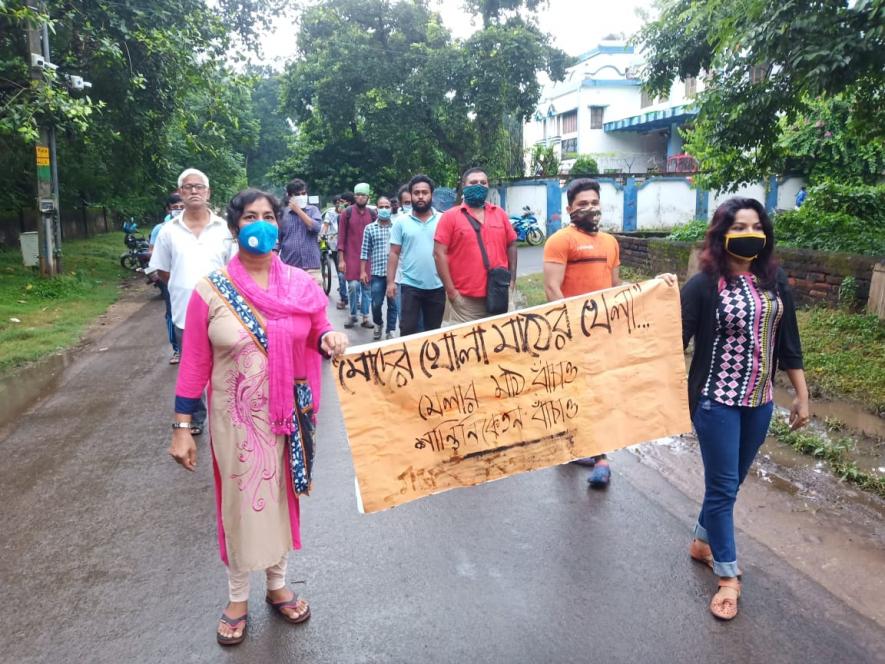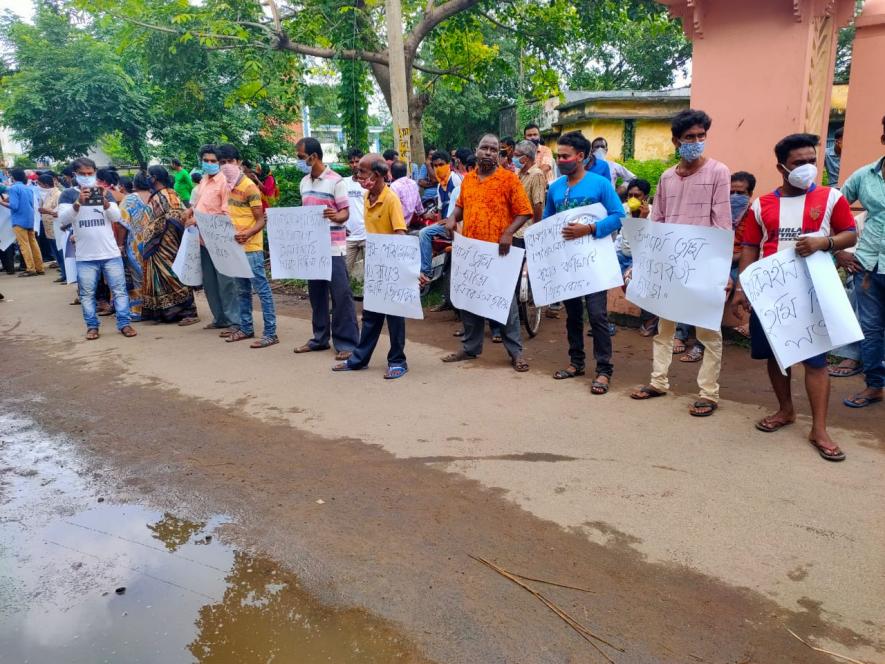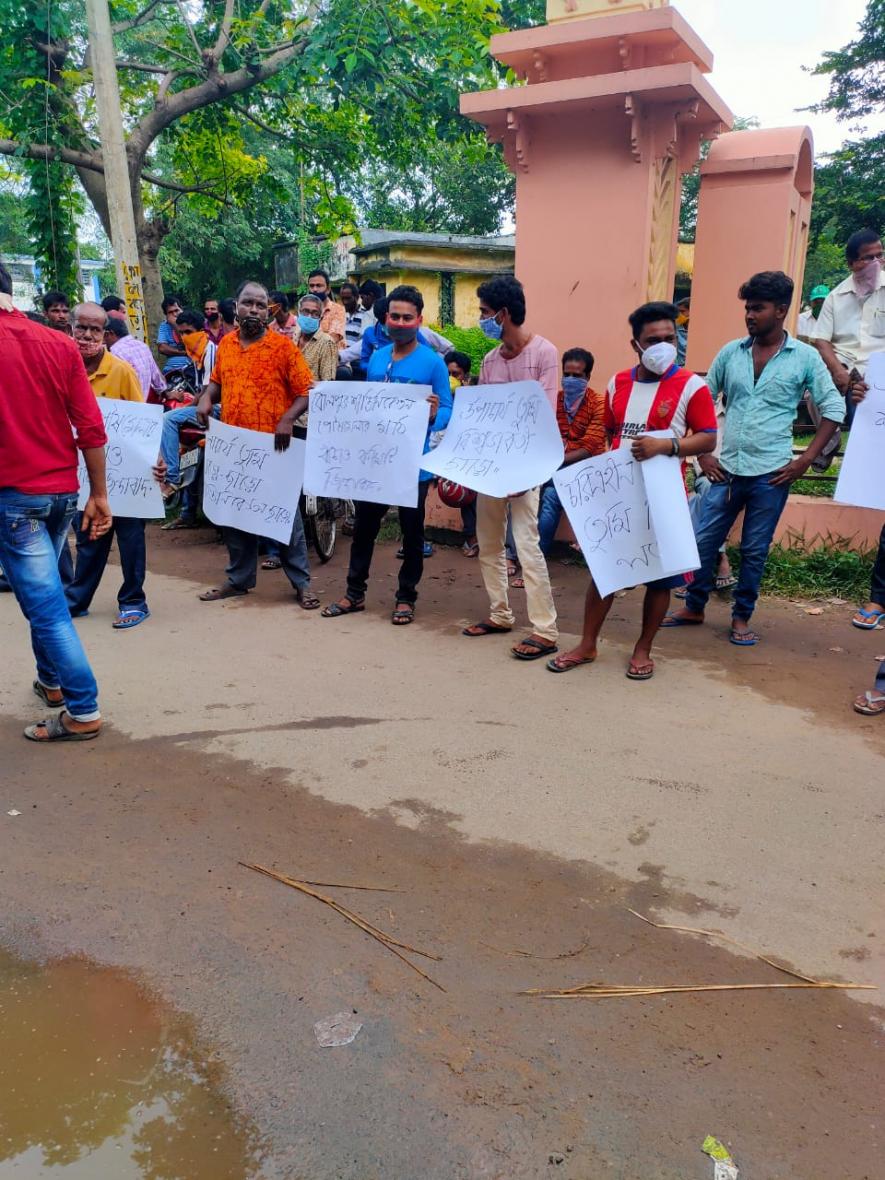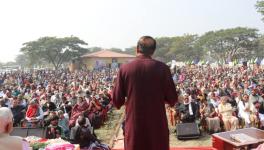What Led to the Ruckus in Visva Bharati University?

Visva Bharati University in West Bengal’s Shantiniketan was rocked by vandalism on August 17 over the construction of a wall around the iconic Pous Mela ground. Several protesters who were part of a rally that morning, opposing recent construction activity initiated by university authorities, turned violent and television footage and social media posts showed protesters demolishing the entry gate to the ground using a pay loader, and ransacking the camp office, bricks, stones and other material brought in for construction.
While Bengal governor Jagdeep Dhankar said the violence was premeditated and conspiratorial and urged Chief Minister Mamata Banerjee to take quick, stern action, university authorities closed down the varsity indefinitely within hours of the incident citing the “volatile situation” and “the threat to many colleagues with dire consequences.”

In a press release issued on the same day, authorities decried the lack of police deployment to secure the campus during the rally and said the matter had been brought to the notice of the Chancellor, Prime Minister Narendra Modi. The press release asserted that the “proposed fence” was necessitated by a 2017 National Green Tribunal order, as well as the recommendations and directions of various committees. It also indicated that as the owner of the venue of the 125-year old mela, the university was well within its rights to construct a wall around it.
These claims were fiercely contested by numerous residents of Shantiniketan, including students, ex-students, faculty members, shopkeepers and activists, who said the construction of walls around the university campus went against the ethos of Rabindranath Tagore, the founding father of Visva Bharati. They accused the current Vice Chancellor Bidyut Chakraborty of being rude, authoritarian, and insensitive to the people’s emotional attachment with the university and the mela ground, and said his decisions were creating a lot of friction between the university administration and students and residents of Shantiniketan.
Brewing crisis
Past and present students of the university students and residents of Bolpur town said that trouble between them and the university administration headed by Bidyut Chakraborty had been mounting for several months. “The first flashpoint was last year’s Pous Mela, when the VC reduced the fair’s duration from six to four days, increased the fees for stalls, refused to return the caution money deposited by stall owners and brought in police to evict traders and craftsmen from neighbouring villages and districts who overstayed on the premises. While this was unprecedented in Visva Bharati, the VC was also accused of molestation,” said Falguni Pan, a third year economics student at the university.

Like Pan, former Visva Bharati student and head teacher of the Labpur Satyanarayan Shiksha Niketan Manisha Banerjee identified the demolition of shops in Ratan Pally in June this year amidst the lockdown as the next flash point. “The VC was at the forefront in Ratan Pally, supervising the demolition of shops behind the post office that had been around for decades, providing a livelihood to several poor families. This happened in the middle of the lockdown, when the families were already severely affected, and contributed to people’s anger against the university administration,” she said.
The decision to construct a wall around the Pous Mela ground escalated these confrontations, more so because numerous people use the ground every day for walking, jogging, playing sports or meeting and chatting with friends. “The VC refused to communicate with us regarding our concerns. But we were deeply concerned by the recent turn of events and were talking to former students, faculty members, activists and local residents and businessmen to find a way out of the crisis together,” said Pan. The Shantiniketan Pous Mela Math Bachao Samiti, comprising students, faculty members, traders, craftsmen, activists and representatives of political parties barring the BJP, was formed on August 12, three days before students and traders spotted the contractor kicking off work on laying the foundation for the wall on August 15 and confronted him.
Also read: Can BJP's Politics and Facebook's Business Thrive without Hate?
Opposition to wall
“We (the Samiti) called for a rally and demonstration opposing the wall on the evening of August 15, which was attended mostly by students. The next morning, we spotted over 100 private security guards and some faculty and staff of the university at the construction site alongside workers. We asked the VC why he had allowed such a large gathering, and why he was intent on converting the university into a jail by constructing walls around it. When he did not provide any answers, we registered a police complaint regarding the unlawful assembly amidst the pandemic,” said Sailen Misra, secretary of the Bolpur wing of the Association for Protection of Democratic Rights, a civil rights organisation, and a founding member of the Samiti.
The Samiti called for a rally opposing the construction of the wall from the Bolpur fire station at 9 am on August 17, the following day. Since the call for the rally was widely publicised on social media and through announcements in Bolpur town and neighbouring villages, activists who were part of the rally estimated it was attended by 4,000-5,000 people, a large number of whom were Trinamool Congress supporters.
The incident of vandalism occurred when this rally was underway, prompting allegations of it being pre-planned and masterminded by Trinamool Congress leaders. Most people in Shantiniketan NewsClick spoke to, however, dismissed these allegations, and said that anger with the VC and the university administration had been mounting over months. “The vandalism on August 17 was certainly condemnable, but it was also a natural outgrowth of the policies and decisions taken by the current Vice Chancellor – be it demolishing shops around the campus that had been around for decades in the middle of the lockdown, or constructing a wall around the mela ground,” said Sunil Singh, President of the Bolpur Byabosayee Samiti and a member of the Shantiniketan Pous Mela Math Bachao Samiti.

“Not only did the VC not pay heed to any of these concerns when we raised them, he also insulted and ridiculed us routinely, and let the issue fester. If anyone must be held responsible for the violence, it is him,” said Singh, echoing the words of several other Shantiniketan residents.
Cohesive force?
Although several days have passed since the incident, the confrontation between the university administration and students and residents has only escalated further. On August 20, three days after the incident, Visva Bharati Students’ Unity – an umbrella body of students’ unions in the campus barring ABVP – issued a press release accusing Chakraborty of disrupting the peace on campus and hampering the safety and security of students and residents of Shantiniketan.
The students’ body called the VC authoritarian and BJP-leaning, provided a roundup of the recent flashpoints, asserted that the incident of vandalism on August 17 was “an organic expression of people’s anger against university officials that had been piling up for days and days,” and called for a wider struggle against the VC in the coming days to “bring back peace and security”. The Visva Bharati Faculty Association also criticised the university administration, saying the incident, like many others in the recent past, could have been avoided through prior discussion with all stakeholders.
“The Pous mela ground holds immense emotional value for people in and around Shantiniketan, not only because it sustains the livelihoods of thousands of craftsmen and shopkeepers during the mela, but also because it is part of the local culture – it is a community space, a space for celebrating what is the biggest festival in these parts with friends, family and visiting relatives,” said Chandranath Sinha, a Visva Bharati alumnus, MLA of Bolpur and fisheries minister in the Bengal government. Sinha accused Chakraborty of being insensitive not only to people’s emotional attachment with the Pous mela ground, but also to the intrinsic relationship between the university and local society and economy.
While calls and emails to the public relations department of Visva Bharati University seeking responses to these allegations remained unanswered, eminent people and organisations from outside Shantiniketan have pledged support to the struggle against the adamant varsity administration. “We stand with the students and residents of Visva Bharati in this struggle, as we believe in a culture without walls,” said Samirul Islam of Bangla Sanskriti Mancha, a civil society group with strong presence in Birbhum, Malda, Murshidabad and other districts in Bengal. “We will campaign on the issue widely in our meetings in Birbhum and neighbouring districts in the coming days, but we would also like the VC to reconsider his stand and pay need to the diverse, pluralistic culture of Bengal,” said Islam.
Also read: 'Passed Without our Consent or Scrutiny': Environment Experts Slam Bhagirathi Zonal Master Plan
Get the latest reports & analysis with people's perspective on Protests, movements & deep analytical videos, discussions of the current affairs in your Telegram app. Subscribe to NewsClick's Telegram channel & get Real-Time updates on stories, as they get published on our website.
























